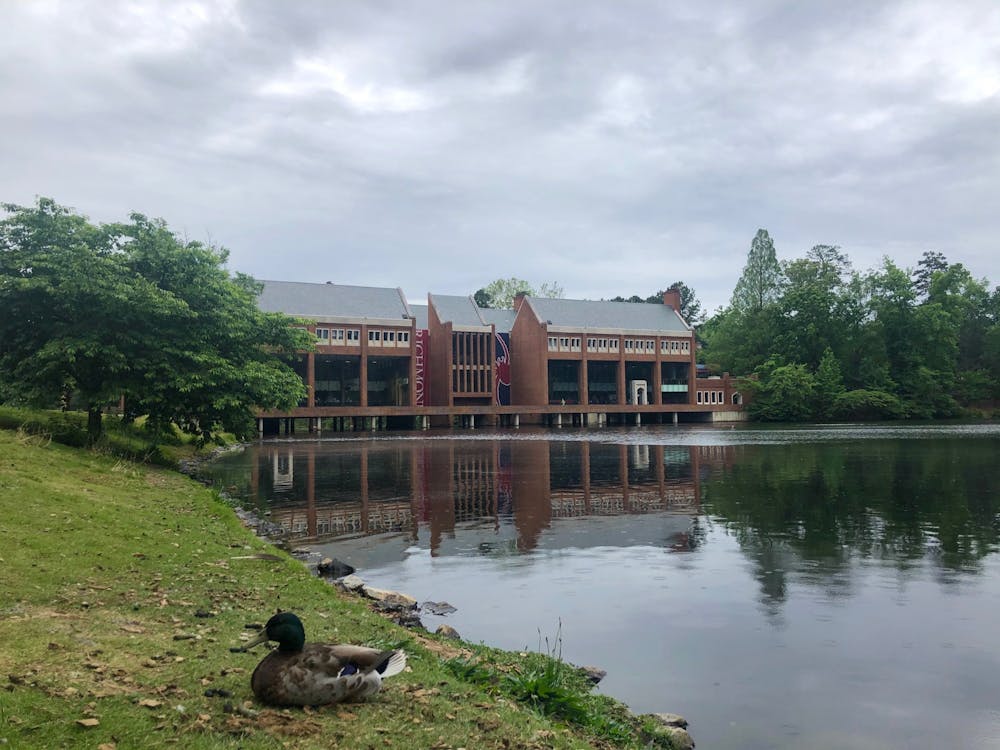The Africana Studies Student Committee will collaborate with University of Richmond faculty and staff to support its proposal for the creation of a department of Africana studies, committee members said.
Rhetoric and communication studies professor Armond Towns and sociology professor Atiya Husain will co-chair a faculty learning community (FLC) on Africana studies, inspired by the student committee's work, during the 2020-21 academic year, Towns wrote in an email to The Collegian.
Towns wrote that the FLC would work to push forward the conversation of Africana studies for UR, with the goal of creating a proposal for an Africana studies program. The program would provide support for the student committee's ultimate goal of creating an Africana studies department, he wrote.
The first non-negotiable demand listed in the student committee's February proposal for the creation of an Africana studies department was a meeting with UR president Ronald Crutcher, Provost Jeffrey Legro and Dean of the School of Arts and Sciences Patrice Rankine.
Rising senior and committee member Kayla Corbin said the committee members had talked with Crutcher, Legro and Rankine, and were encouraged to expand their work to the faculty level. Administration suggested specifically that the student committee work toward starting the FLC, she said.
Shira Greer, a rising junior and member of the student committee, said the committee wanted to expose all UR faculty to the idea of Africana studies. The focus of its work will be within the School of Arts and Sciences, because the School of Arts and Sciences faculty will have to vote on the creation of a program or department, she said.
"We really want to make sure [faculty] are all aware of what Africana studies is and how it would really contribute to our academic lives at the university," Greer said.
Towns said his work on the FLC would be focused on researching what formal actions are required to legitimize Africana studies at the administrative level at UR.
"There’s a lot of official steps that you have to take to go from the student proposal into a full department, which may not be obvious on the surface," Towns wrote. "The general sense is that many people at the faculty level would prefer to see this as a program before it is a department, so that means I have to learn about the formal channels that you have to go through to create a program.
"To get a program, you have to think about accreditation, how the program will affect the university, who will teach in it, what courses will and will not count, what new courses do you need, and much more. So in part, my focus is on learning about academic curriculum, both at UR and beyond."
Greer said UR's move to remote instruction caused by the COVID-19 pandemic slowed the student committee's progress during the spring semester, but that its efforts had become refocused after UR rescinded the admission of an incoming first-year student in response to a video that circulated on Twitter of the student using racial slurs and demeaning George Floyd.
The incident increased student support for the creation of an Africana studies department, Greer said, and the student committee used it as an opportunity to call for UR to implement institutional changes beyond rescinding the student's admission, Greer said.
Enjoy what you're reading?
Signup for our newsletter
Akeya Fortson-Brown, a rising junior and member of the student committee, wrote in an email to The Collegian that she hoped to see UR administrators, faculty and students make a commitment to anti-racism, specifically anti-Black racism, in the coming semester.
Fortson-Brown listed other results she hoped to come from the committee's work, including material and meaningful ways to acknowledge UR’s history that will change campus culture to be truly inclusive. Comprehensive educational spaces and areas of study will be a part of this change, Fortson-Brown said.
Corbin said FLCs were not always used primarily for the creation of programs but that the student committee hoped the Africana studies FLC would garner more support for the creation of an Africana studies department.
"Right now our biggest challenge is getting faculty on board," Corbin said, "and our next thing is going to be looking for some sort of guarantee from the university that, even after this FLC, we'll definitely have a program."
Based on the student committee's conversations with Crutcher, Legro and Rankine, there is no current guarantee of a department, she said.
Towns said the FLC members would be working with students with the hopes of achieving a common goal from different positions.
"In order to bring Africana [s]tudies as a department to UR, we need as many levels involved in the process as possible," Towns wrote. "But I think that it is necessary to continue to follow the students lead."
Fortson-Brown wrote that continued determination around creating an Africana studies department would be essential.
"We need more urgency and commitment to change," Fortson-Brown wrote. "It is time for students, faculty, and administration to put action behind their words and promises."
Corbin said the student committee would form an action plan at the end of the fall semester based, in part, on the progress of the FLC.
The student committee will release more information about the FLC, including the names of faculty members on it, when those details are finalized, Corbin said. As of July 23, the student committee's petition to bring Africana studies to UR had 1,430 signatures.
Contact news writer Morgan Howland at morgan.howland@richmond.edu.
Support independent student media
You can make a tax-deductible donation by clicking the button below, which takes you to our secure PayPal account. The page is set up to receive contributions in whatever amount you designate. We look forward to using the money we raise to further our mission of providing honest and accurate information to students, faculty, staff, alumni and others in the general public.
Donate Now



